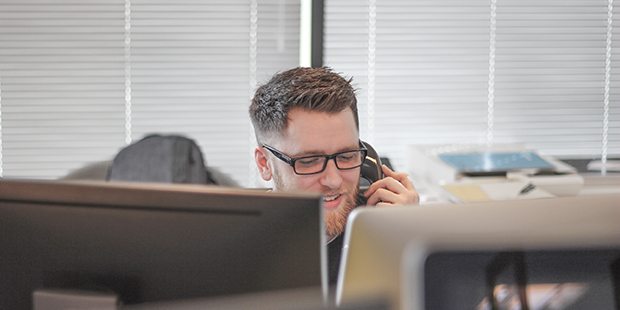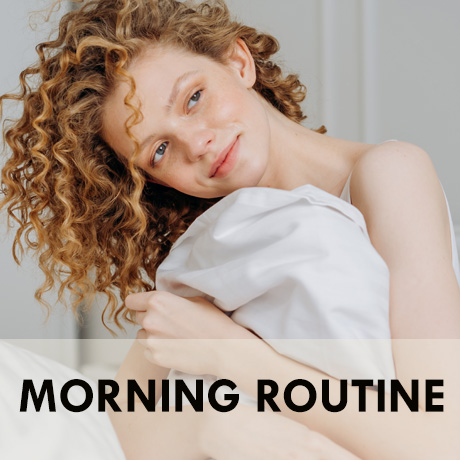Morning routine: tips for a good start to the day
Easier to wake up and become a morning person - how does it work?
We all have days when it seems impossible to get out of bed. Whether you've been up too late enjoying yourself or it's just the weekend, sleeping in from time to time is both natural and normal.
For some people, however, getting up early is a constant chore and it just doesn't get any better. Not having a lie-in and not being able to get up early can become a major burden on your day-to-day life, making it difficult to be productive and meet early-morning appointments on time.
The good news is that this issue can be fixed. By establishing a routine and adopting healthy lifestyle habits, you can be ready to jump out of bed at the first alarm. Even if you're a self-proclaimed night owl, here's how to wake up easier and learn to love your mornings.
Why waking up is so hard
We all know the feeling of being sluggish, tired and unmotivated in the morning. According to a study by the National Sleep Foundation, almost half of those surveyed say poor sleep is affecting their daily lives. Of those surveyed, 20% said they didn't feel refreshed the next day, and 25% rated their sleep quality as poor.
With this data, it's not surprising that so many people have trouble waking up in the morning. But what if you strive to go to bed at a reasonable time and maintain a healthy, active lifestyle - and still don't sleep well and wake up energized? Various sleep disorders could be to blame for this.
Sleep disorders that make it difficult to wake up
Certain sleep disorders and conditions can make you feel even more tired when you wake up. Sleep apnea, for example, is a common sleep disorder characterized by partial or complete obstruction of the throat.
In sleep apnea, breathing stops involuntarily during sleep. Loud snoring is the most common symptom of sleep apnea, but it can also cause a person to wake up gasping for air, with a dry mouth, or a headache.
If you have trouble falling asleep at a normal bedtime or suffer from insomnia, it's also difficult to wake up early. Night waking, waking up too early, daytime sleepiness, irritability, and poor mental performance are signs of insomnia. This sleep disorder is called chronic when it occurs continuously for three months.
Sleep sluggishness is another common reason you struggle with fatigue and mental drowsiness early in the day. While not a sleep disorder, sleep inertia is usually caused by being woken up abruptly, either by an alarm clock or other influencing factors.
According to neurologist and sleep medicine specialist Dr. Brandon Peters attributes this phenomenon to drowsiness and cognitive and psychomotor impairments that can occur immediately after waking up. Regular sleep deprivation and waking up earlier can disrupt long or deep sleep, causing sleep inertia.
Circadian rhythm disorders
Changes in circadian rhythms can also be responsible for poor sleep. The circadian rhythm is responsible for the sleep-wake cycle, regulating when you feel sleepy, when you wake up and how much energy you have during the day.
The circadian rhythm is primarily influenced by light. The lack of sunlight after sunset triggers the circadian rhythm, causing the brain to release the hormone melatonin, which makes us feel sleepy and prepares us for a restful night's sleep.
The circadian rhythm can be disrupted by a number of sleep disorders, one of which is delayed sleep disorder. In this disorder, most common in teenagers, the body clock prevents the sufferer from going to sleep at a normal time. As a result, they tend to fall asleep between 2am and 6am, making it difficult for them to wake up before the rest of the world has started their day.
The circadian rhythm can be disrupted by a number of sleep disorders, one of which is delayed sleep disorder. In this disorder, most common in teenagers, the body clock prevents the sufferer from going to sleep at a normal time. As a result, they tend to fall asleep between 2am and 6am, making it difficult for them to wake up before the rest of the world has started their day.
The body's natural sleep cycle can also be affected by many lifestyle factors, such as: B. by night work and sleeping through the day. Shift work causes a person's circadian rhythm to work in reverse, ignoring nighttime melatonin secretion. This can make it difficult for shift workers or people who work irregular hours to get the sleep they need during the day, leaving them chronically tired from day to day.
Other factors that can disrupt a person's circadian rhythm include staying up late, an irregular sleep pattern during the week, heavy alcohol consumption, and jet lag. Anxiety and ADHD can also affect a person's ability to sleep well.
Easier to wake up
Whether you suffer from a sleep disorder like sleep apnea or are simply prone to late-night Netflix sessions, there are some lifestyle changes that can make waking up more comfortable.
Clarify your motivation
If you are reading this article, you probably have a reason why you want to get up early. Do you want to work out before work? Would you like to have breakfast with your family?
If you are clear about why you want to get up earlier, you can sustain this change. Michelle Segar, a healthy lifestyle expert with a master's degree in public health, suggests telling your loved ones about the change you're trying to make. A partner who supports you early in the morning can be just the motivation you need to stop hitting the snooze button and get better quality sleep.
Establish a consistent bedtime routine
In order to wake up with enthusiasm, it is first and foremost important to create a solid bedtime routine. If you go to bed at 1 a.m. one night and at 8 p.m. the next night because you are very tired, your brain does not have time to adjust to a steady sleep pattern. One way to help yourself fall asleep earlier and at a consistent time is to set a limit on your devices.
Because the blue light from smartphones and tablets can mimic the sun and disrupt your circadian rhythm, it's best to limit use of these devices after sunset. Sticking to this schedule over the weekends can also keep your sleep-wake cycle consistent to get your biological clock back on.
Create a consistent morning routine
A morning routine is something that almost all early risers have in common. Some use the time to meditate, exercise or keep a journal. Others use them to pour themselves a cup of coffee and read the newspaper - because that is perhaps the only moment to enjoy the peace with yourself. Whatever you decide, make sure you get adequate sunlight. This will keep your circadian rhythm under control and help you sleep better at night.
Try the R.I.S.E. U.P. method
The R.I.S.E.-U.P. method is particularly helpful for people who suffer from sleep inertia, but anyone who hates mornings can benefit from adopting at least some of these principles. This from Dr. Harvey, developed at the Golden Bear Sleep Research Center, helps you wake up feeling more alert and energetic.
Brief explanation of the acronym: R.I.S.E.U.P. method
1. The "R" stands for " Refrain from hitting the snooze button" = Don't hit the snooze button. 2. The "I" stands for "Increase your activity in the first hour" = increase your activity in the first hour". That means exercise as soon as you wake up or just do something small like a short walk. 3. The "S" stands for "Shower" = shower. 4. The "E" stands for "Expose yourself to sunlight Expose yourself to sunlight" = Expose yourself to the sunlight. 5. The "U" stands for "Upbeat" music" = listen to upbeat music!Track your sleep
Tracking your sleep can help you stick to your morning and evening routines, especially when you realize that maintaining a consistent sleep pattern can have a positive impact on your sleep, recovery, performance, and overall well-being . The Biostrap Recover Set gives you access to valuable insights into your sleep and your nightly biometric data. And when you start observing trends over a longer period of time (week, month, year), you'll see the long-term impact of your lifestyle choices on your physiology.
Are you curious to find out when is the best time to go to bed and when to wake up? Biostrap's advanced sleep analysis feature, called Sleep Lab, gives you just that and more.
Easier to wake up and become a morning person
If you're wondering how to wake up easier, you're not alone. Millions of people suffer from sleep disorders and lifestyle factors that make it difficult for them to fall asleep, get enough sleep, and maintain a consistent wake time.
Fortunately, making lifestyle changes in the form of a morning and evening routine can help you reset your body clock and develop better sleep habits.
So what are you waiting for? A more energetic and productive morning awaits!
The best remedy against tiredness and lethargy
The most important step is to understand your own sleep, because this is the only way to get to the bottom of the cause.
With the Biostrap EVO sleep tracker you gain access to valuable insights into your sleep and your nightly biometric data.
Start monitoring trends over time (week, month, year) and you will see the long-term impact of your lifestyle choices on your performance and well-being.
The Biostrap is currently one of the best sleep trackers available and evaluates your sleep with great accuracy.
The sleep tracker also impresses with a very intuitive and clear app interface and is comfortable to wear on the wrist.
More information about the Biostrap EVO can be found here: To the Biostrap
Back to topic portal: Fatigue< /a>
Further information is available on the following pages:
Author: Robin Weitz, last updated 18.10.2023






































































